John Wick's Play Dirty by Alien Rope Burn
"Then again, as my buddy Jess Heinig so aptly comments, John put all his points in Con Man."
Original SA postWith
Play Dirty 2: Even Dirtier
kickstarter about to complete with a $16,000+ payout, I realize...
... I have 41 hours to write and post a F&F writeup of
Play Dirty
.
GO.
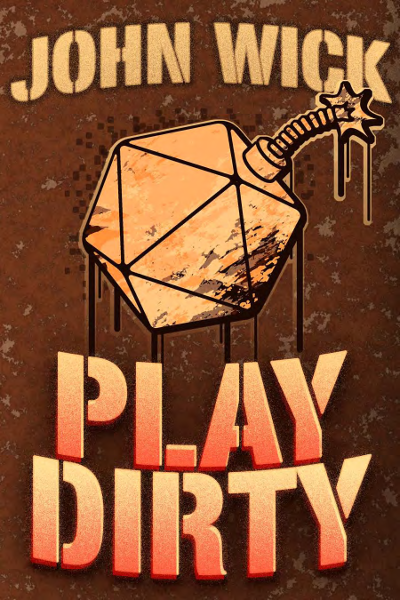
Play Dirty part 1: "Then again, as my buddy Jess Heinig so aptly comments, “John put all his points in ‘Con Man.’”"
I wrote a bunch of words on this, but I'm scratching all that out. I started out like the typical way I write an F&F, snarking and nitpicking my way through the text, but it didn't feel right. I just felt like a bully. I've met John Wick a couple times, even talked to him for hours, though I wouldn't expect him to remember, or to remember the time he lost his cool and shouted at me before storming off. He was full of piss and vinegar, and I was full of whatever metaphor goes for fandom. I learned a lot from John Wick that informed me as a gamemaster. Some of that I've really had to unlearn. It didn't work for me. It may not work at all. There's some good advice in this book. There's also a lot of ways for a GM to smugly abuse their players.
Both John Wick and I are different than when this book was written, so don't judge him too harshly. That's not to say he's a different
person
, but that he's grown since then, and I have too. He apologized for yelling at me, but I haven't really seen him since then. It's probably been a decade. I was asked to write this by a few people, but I don't necessarily know if I have a profound insight. This book is part of my history, though, as I tried to learn from it. Even John Wick admits in the introduction he isn't the same guy who wrote these articles.
That being said, you can still judge him. It's not for me to stop you. I just want to let you know I'm trying to be fair. This is going to be very hard as we get into this book. It's probably okay to be a little unfair, given that's what Wick prides himself on in these pages.
Introduction
"The Fifth Wall" is Wick's manifesto for this book, trying to make sure players feel that they're the center of the game. It's a good idea presented smugly. There'll be a lot of that.
Wick hints at a secret hidden in the text, but it's fairly obvious to me: he claims to be a "killer GM', but it's pretty much the opposite. He does just about everything but kill player characters. He drags them through the mud and blood, but doesn't generally outright murder them. He more murders the
ego
of his players, as we'll see.
It's also a bunch a nonsense once he gets around to literally describing how to kill characters but damnit I am trying to be fair here.
On to the next one.
Next: "There's more than one way to kill a Champions character."
"I told him he was seeing trolley cars wherever he looked and he had no choice but to make the roll - and make it at -5, at that."
Original SA post 38 hoursPlay Dirty part 2: " I told him he was seeing trolley cars wherever he looked and he had no choice but to make the roll - and make it at -5, at that."
This chapter is about "murdering" characters with their traits, mainly their drawbacks and disadvantages. Mr. Wick is all about making you pay for those free points you got. Now, the issue I'm going to point out is that the example game is Champions , a game that expects you, in the merry Marvel way, to humanize your character by loading them down with drawbacks. So it's a soft target of a game when it comes to this. Any character is going to have drawbacks.
So let's see what Mr. Wick does with this.

Episode 0: Hit 'Em Where It Hurts
The answer is Jefferson Carter. He's a wealthy and charitable millionaire that goes to great lengths to defend superheroes legally and ensure they're free to go about their derring-do. In short, he's set up as a patron for the PCs. Oh, and he's a telepathic sadist that plays "human chess" with people.
John Wick posted:
Why has Carter gone to all this trouble?
The answer is simple.
Because he can.
Carter is a singular point of criticism for Play Dirty , because his seemingly weak characterization makes it hard not to seem that Carter is Wick and Wick is Carter, a god-NPC set up to troll players. That's not quite the case, but he's quite deliberately designed as a working tool of the antagonistic GM style.
So he describes Jefferson undermining a heroine through her "dependent" grandma by exposing her identity violently. Gran-gran dies of a heart attack. There was a swaggering "combat monster" who gets his berserk drawback triggered by a psychic foe. He hurts some innocents and gets thrown in prison. There's a hero with a code against hitting women and obeying the law. So he gets hooked up with a love interest that turns out to be a villain and is drugged into beating the crap out of her. Each of these is described with a certain glee.
John Wick posted:
Malice retired the very next day and nobody bought a DNPC again.
John Wick posted:
I suggested to Scrapper’s player that he should be more careful with his Disadvantages. Surprisingly enough, the next character he made was a little more respectful of the rules. Go figure.
John Wick posted:
Needless to say, under his drugged state, he demolished the poor girl (he had 50 more points to play with, after all).
Let's take Scrapper aside for a moment. Scrapper goes berserk when he sees red trolley cars; his mother was killed by one. It's a silly way for a Champions character to pack on points for a game taking place in a midwestern city, to be sure. In the article, John doesn't bar the character from his game. He lets him play for weeks, to the point other players complain about him, then drops the character-eliminating bomb. He doesn't just explain to Scrapper's player "you know, that really isn't in the spirit of the game", seemingly. He has to punish the player for his temerity, instead, in a passive-aggressive way, instead of confronting the situation openly.
But we haven't even gotten to the pièce de résistance for Wick which is punishing characters for their advantages instead. Make a lucky character who uses a reroll to avoid an area attack leap into a bigger group of villains (or just guilt him for leaving his friends to get bombed). Or find an envelope of money that belongs to a criminal group!... it's all a strange definition of "luck", really. To nail a character with Immunity to Disease/Poison, Jefferson creates a special disease that targets metahumans (and somehow overcomes the Immunity), but Mr. Immunity is immune to the cure. Then there's using the Find Weakness power, so Jefferson throws punks against the heroes that have no hope, and so when they exploit the punks' weakness, they murder them.
Now, a commonality of these is that they require a... creative reinterpretation of the definitions of each advantage. None is really in the "spirit" of the rules. But I guess following the spirit of the rules is something to apply to players, not GMs, as far as Young Wick goes.
Lastly for this chapter, we have Mr. Fabulous, whose player works out a tragic death scene with Wick's involvement where he tries to talk down a kid with a gun and gets show. This is a demonstration of his Code vs. Killing, but also is... dun dun dun, another Carter plot, where he tries to make everyone feel sad about the death of Fabulous, but instead they get mad and find out that somebody hired the gun-wielding kids. Of course, that "positive" outcome only came out by going Wick's way, but I could be reading too much into it.
On to the next one.
Next: Hello.
"And the Good Side makes you want to sleep with your sister and kill your father."
Original SA post 35 hoursPlay Dirty part 3: "And the Good Side makes you want to sleep with your sister and kill your father."
Now, Wick talks about the difference between a killer GM and a dirty GM, where a killer kills but a dirty GM apparently challenges the players. Mind, looking at the previous article, I'm struggling to see the difference. Just because he didn't kill characters doesn't mean he didn't throw them into retirement, jail, illness, or any other number of other means to remove them from the game.
Episode 1: Getting Dirty
John Wick posted:
But (and this is an important “but”, folks), every time they get knocked down, they want to be able to get back up.
Okay.
John Wick posted:
That’s right. Just like the Chumbawumba song.
Okay, you can stop right there .
John Wick posted:
Being Irish, it just comes to me naturally.
Goddamnit, Wick. :facepalm:
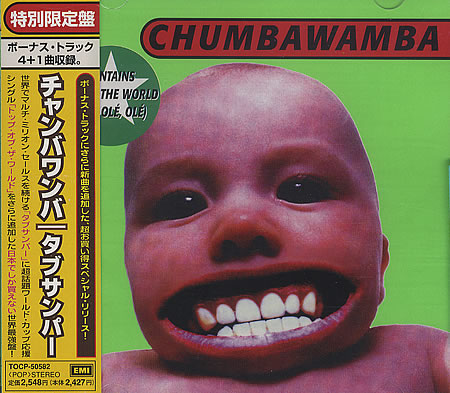
So, Wick talks about throwing off setting assumptions players might take to heart. For example, in Amber , he made Corwin a bad guy (the narrative of the novels coming from a false Corwin) to throw off the players understanding of the setting. He explains on how to do the same with Vader; that the Jedi just wants revenge for being on the losing side and manipulate Luke against Vader.
It's actually a neat idea and I'll give kudos to Wick for it. It's a short column and there's not much to add. Things are looking better. I hope.
On to the next one.
Next: "And so, the purpose of this second episode of Play Dirty is devoted to explaining the often misunderstood actions of one of my oldest friends, Jefferson Carter."
dammit
"Was that a low blow? I can’t tell anymore."
Original SA post 34 hoursPlay Dirty part 4: "Was that a low blow? I can’t tell anymore."
So, the internet being the internet, some people came out and pointed out that Carter was a jerk villain to pull on players. So he tries to explain himself.
Episode 2: The Return of Jefferson Carter
Wick used to be known as a killer GM, running Call of Cthulhu , but eventually he got sick of mulching character sheets. So he took up Champions , vowing never to kill characters. Of course, he still took characters out of the picture all the time, pointing the finger at the players for giving up. Is that fair? Eh, you can decide.
He tells the story of his game, how he drove people to quit until he got a crew of regulars that wouldn't give up, including the infamous example of a player that spent six weeks waiting in jail for the other players to break him out. After a year and a half, they eventually do find out about Carter and manage to take him down, though he makes double-plus attempts to ruin them, like financial hassling and false criminal charges (including rape), as well as actual assassination attempts, but they get to throw him in jail and bring in some of the players that quit for cameos.
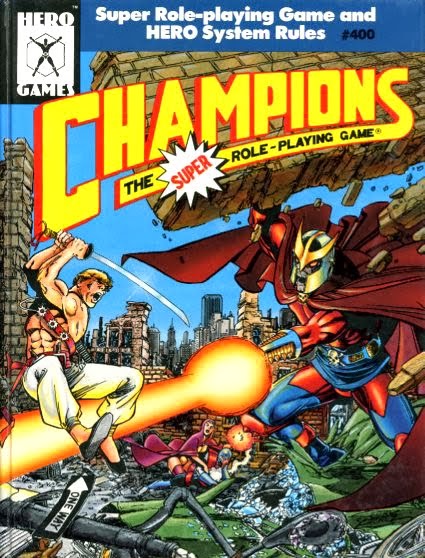
Wick admits the mistake in writing the earlier article was talking about the punishment without the payoff, but at the same time-
John Wick posted:
Time and time again, players kept redesigning new characters, thinking they created the ultimate “anti-Wick” character. “Let’s see him kill this one!” they’d say.
But they kept missing the point. I never killed anyone. I just pushed them. Pushed them as hard as I could, as far as I could. Some kept fighting the good fight. Others gave up and left, disgruntled that they’d been “Wick-ed” (a term someone on the Pyramid discussion boards just recently invented). I never killed them. But they always always—gave up.
A case of "show, don't tell?", or an example of simple passive-aggressiveness? Who is at fault for them "missing the point", the players, or the GM who made them struggle over a year to provide it, and got a dozen players to quit his game?
Then we get a digression about how Wick can't get a non-gaming job, despite his game writing experience and winning awards, but since he doesn't own that work, he can't make money off of it. And so he quit AEG to make his own way... which he'd eventually find. I remember hearing people ask AEG employees when they'd get Wick back a long time ago. They'd laugh, maybe a bit nervously. Some bridge was burned. You see it in one of the last Bayushi Kachiko cards, the one that has "Uikku suku diku" written in kanji on the doorframe. There's the credits page for the Legend of the Five Rings RPG which credits a lot of last-minute work by a notable team of writers reworking Wick's manuscript. There's the Five Rings adventure I had playtested for Greg Stolze which saw Wick (and Ree Soesbee) rewriting the whole adventure without Stolze's input. There's the vitriol Wick has hissed about Ryan Dancey in other columns. Maybe Wick just quit to pursue other creative endeavors. Or maybe- just maybe- he might have had difficulty getting on with folks. He was an angry guy at the time, as far as I can tell. I remember him complaining to me with things they wouldn't let him do in the CCG story... while he was still writing for it. Which was fantastic to hear as a fan, but for an employer to hear, it'd be much more damning.
But it's mostly a speech in how much crap he's willing to go through because he loves role-playing games. Which is obviously true, because I think it's essentially true of anybody who self-publishes.
On to the next one.
Next: "There’s nothing to learn here. Move along."
"Well, I’m here to tell you thats a load of horse hockey."
Original SA post 33 hoursPlay Dirty part 5: "Well, I’m here to tell you that’s a load of horse hockey."
This is on getting players to help you design a setting. Wick sees getting too far into detail as a trap, and opts to find freeform ways to let players design part of the setting. It's a similar philosophy to modern games like 13th Age or Apocalypse World or Dresden Files , but some of the techniques are a little different.
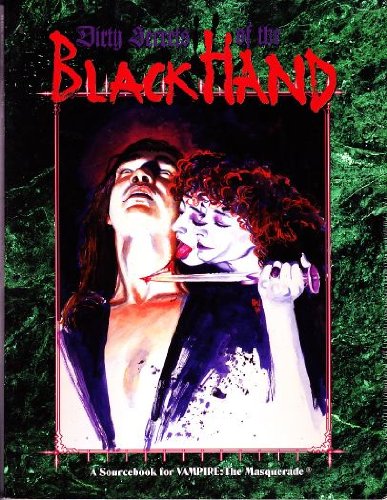
Episode 3: The Living City
First he describes having players take up the roles of NPCs for a Vampire game, handing them off to players absent from a scene, and using nametags to keep things clear. He sees that as an interesting way to get players to flesh out a setting and see it as a large whole. Secondly, he goes over letting PCs use the environment creatively in most than just fights, but also to create new NPCs or locations.
John Wick posted:
They were standing in the college campus cafeteria and one of them said, “And there’s Mean Mr. Mathers over there, eating pea soup.” Then, another one chimed in. “He’s the only one who eats the pea soup.” It was brilliant and I let it stick.
I like pea soup.
 But then, I might be mean from time to time.
But then, I might be mean from time to time.
Really, this is a little old hat at this point in gaming over a decade later, so there's not much to go on about. Wick has a habit of talking down instead of with, but it's okay and he compliments his players a lot. This chapter is pretty good, even.
On to the next one.
Next: "I do not write “pretty good.” I write well ."
"This guy is The Enemy."
Original SA post 32 hoursPlay Dirty part 6: "This guy is The Enemy."
This one's a doozy.
John Wick posted:
This month, we’re talking about Problem Players.
Now, the chief problem with these guys is that most of them are friends of yours. Like Bob who sits at the corner of the table with his laptop open, playing Starcraft when he should be paying attention, with his Übermonster character all full of loopholes, who barely looks at his dice when he rolls them (and hopes nobody else does because they’d see that 17 he rolled is really a 7), who won’t go along with the rest of the party because that would “compromise his character concept.” Yeah. That guy. We’re talking about him .
Obviously, the way to deal with these kind of things is to take Bob aside, talk with him about your concerns, see if he'll work with you as an adult. And Wick agrees! For a moment. But only if he stopped there. If only.
John Wick posted:
And, by the way, that is the real way to handle this situation. If Bob is screwing up your game, you tell him he’s screwing up your game. But if that tactic doesn’t work (or you’re afraid of the repercussions of doing it), then try a few of the following tactics.
In short: these are tactics for assholes. We start with Wick's technique for dealing with grim loners that always kill. Have the cops capture them and throw them in jail. He puts a lot more
 into it, but that's the gist. But that's not all!
into it, but that's the gist. But that's not all!
John Wick posted:
Now, I don’t know about you, but I have a rule in my games: you don’t get to make another character until the one you’re playing dies. That means, Bob gets to play his perfect combat machine in an 8x8 cell for the rest of his natural life.
“What are you doing this round, Bob?”
“I’m watching the cockroach crawl across my cell.”
For life.
If he asks really nice (and agrees not make that kind of character again), I’ll let him make a new character. Of course, a few years later, Mr. Bad Ass breaks out of prison and goes after the party for revenge.
As an NPC.
Played by Robert DeNiro.

I really just need to let a lot of this speak for itself:
John Wick posted:
But then there are players who feel they need to break other rules. You know, the ones not listed in the book. “The Laws of the Table,” one of my players called them. They boil down to a few simple rules:
I. Pay Attention
II. Don’t Invoke Monty Python
III. Don’t Read at the Table
IV. If You Must Speak, Whisper or Pass a Note
Those kind of rules. Players who can’t seem to follow these simple rules of etiquette really chap my hide.
So what's Wick's solution, somebody breaks a rule, a black die goes in a bowl. Then, on a "crucial" roll from a different player, remove the die and say:
John Wick posted:
"YOU FAIL."
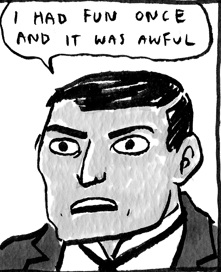
He suggests you may want to have white die go in a bowl for "YOU SUCCEED". If you like.
Now, the next bit has to how to deal with powergamers and system abusers. You kill them.
Well, there's a little more to it.
What you do is use a GM screen, and then arrange some dice as a powerful critical hit. Then, after giving the powergamer a tough fight against a combat monster you've designed, you sigh, shake your head sadly, and reveal the critical to kill off the character.
Seriously. Dammit, Wick. But certainly he's never used that kind of trick in real life, right? It's just bluster?
John Wick posted:
Now this is a nasty trick. I used to use it a lot when I was running Champions.
... nevermind.
How to deal with rules lawyers:
John Wick posted:
First, take away his character sheet. Then, tell him if he doesn’t remember how many dice to roll, or if he rolls the wrong number of dice, or if he forgets something on his character sheet...
HE FAILS.
It’s all about emphasis.
Or replace his dice with lower-value dice! Or let him automatically get hit when he's not paying attention and looking something up. Or-
John Wick posted:
When Rules Lawyer Bob gets hit with a blind spell, blindfold him.
“What did you roll, Bob?”
“I can’t tell. I’m blindfolded.”
“Well then... YOU FAIL .”
Wick wraps up this section saying he doesn't use these techniques very often, but they're an important way to teach a player lessons. Are they? Really? Or are they just a way to passive-aggressively lash out at pet peeves? Well. I guess not all of them are that passive.
Oh, and I ran across some art for the upcoming illustrated version of a the superheroine watching gran-gran die, too late for the relevant post. Apparently the next reprint will be illustrated.
Yeah.
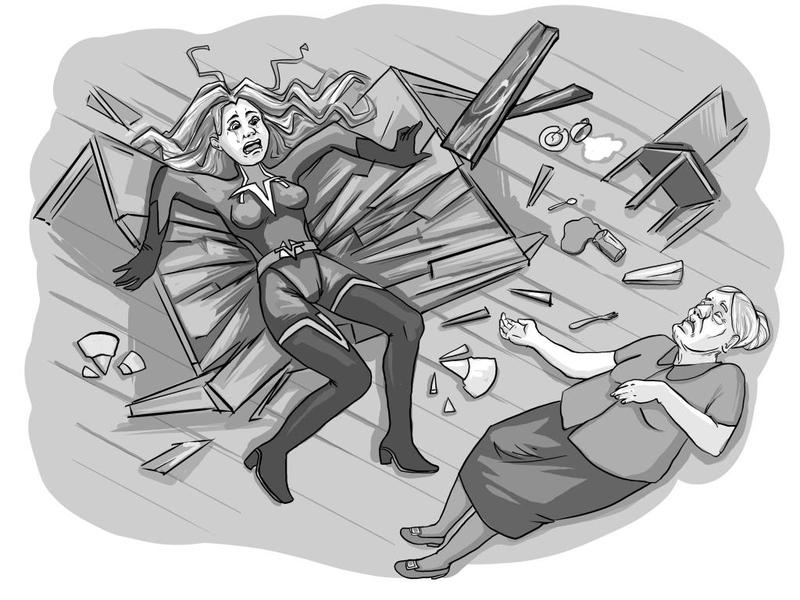
On to the next one.
Next: "I’ve been to wrestling camp, folks. I’ve been taken down by my thumb ."
"You get hit, you get hurt. You get hit again, you get killed."
Original SA post 30 hoursPlay Dirty part 7: "You get hit, you get hurt. You get hit again, you get killed."
John Wick posted:
I know what you need. Oh, yes. I do.
You have a problem with the way your game is playing, but you can’t quite put your finger on what’s wrong. But I know what’s wrong. Oh,
yes. I do.

Episode 5: Dirty Fighting
So John wants us to remove hit points to make combat more real . And gives us some ways to do it.
The first is basically a two-hit solution. You take one hit, you're wounded, you take two hits, you die. Oh, you don't like it? Well maybe you're just not brave enough or smart enough, Wick says. Realism, yo!
Then there's removing knowledge of hit points, which he credits to Jonathan Tweet or Danny Beech, where the GM rolls all the hit dice, keeps players' HP totals secret, and keeps all damage secret. You get a description of the damage and that's all.
The next suggestion follows the last, which is to give people bonuses for being descriptive in fights, but also have particular damage thresholds of PCs' hit points to describe particular wounds. He gets way, way into describing the gory ends PCs meet:
John Wick posted:
If a player takes a 25% hit to the left arm, his fingers go numb, blood sprays in his face on regular intervals and the pain shoots up his arm, into his neck just behind his eyes. Don’t forget the fact that all the pressure in his blood stream is now compromised, making his heart beat a lot faster and a lot stronger as it tries to compensate. He’ll lose a bit of his vision from the pain, experience disorientation and possibly black out from the tissue trauma.
Wick also mentions that you should reward creative and experimental moves in combat. Or that maybe you should require a "Wounding skill" to identify wound severity. "Yep, your arm's off." "I couldn't tell!" Then he discusses having one villain face off against a PC party, generally by pulling off every trick or advantage they can.
John Wick posted:
This is a mistake. Fighting a villain in his own lair, where he knows the terrain and they do not, is to his advantage. He knows all the safe places to hide. He knows where all the tricks and traps are. He’s not alone; he has his lair on his side. And, because Carter’s an Eagle Scout who follows the Scout’s motto, he’s prepared for such a contingency.
He has nerve gas to stun any characters who are susceptible to it. He has the floor wired for electrocution. He can kill the lights, grab the hidden infrared goggles and proceed to kick ass.
Oh, shut up about Carter already.

There's a lot of
 about how awesome Sun Tzu and Musashi are and how you should read their books.
about how awesome Sun Tzu and Musashi are and how you should read their books.
John Wick posted:
So, your next combat should sound like this:
Player: I roll to hit. Succeed. Roll to damage. Ten hit points.
Game Master: The villain grabs your sword arm (dice roll). He succeeds. You can’t use your sword next round because your sword arm is tangled up.
Player: Uh. Okay. Roll for initiative?
Game Master: Sure. But you subtract two from your roll because you’re surprised.
(Dice roll.)
You lose?
Player: Uh, yeah.
Game Master: All right. He twists your arm. He rolls Strength. You roll Stamina. He gets a +5 because he’s got an arm bar on you.
Player: Uh, okay.
(Dice roll.)
Game Master: All right. The villain won. He takes you down to the ground. Now, he’s on top of you. You’re face down on the ground. He’s got your arm behind you, and your shoulder’s making strange sounds. He grabs hold of your hair and pulls your head up just before it comes slamming down into the castle’s stone floor.
Man, those dumb players, didn't they know they were walking into a real man's fight ?

John Wick posted:
How did you react when Tyson bit off a piece of Holyfield’s ear? That’s how you were supposed to react. Unfortunately, it just pissed Holyfield off, but the plan was solid.
Yes, to champion dirty fighting, let's use an example where dirty fighting entirely backfired on Tyson . The thing is, this article is about a very particular kind of game. It's not a bad thing necessarily to be draconian with damage, but it's only one particular play style. It also ignores that all the planning, forethought, and creativity won't save you from a bad roll. And PCs take a lot more hits than NPCs do.
On to the next one.
Next: "It’s the reason I have such a problem with Star Trek ."
"Like Super Chicken says, 'You knew the job was dangerous when you took it.'"
Original SA post 22 hoursPlay Dirty part 8: "Like Super Chicken says, 'You knew the job was dangerous when you took it.'"
John Wick posted:
Not too long ago, a group of friends and I were sitting around a table, listening to Dennis Leary’s No Cure For Cancer , laughing ourselves sick. One bit caught us by the collar and threw us down to the floor: the Doctor Leary Psychoanalytical Seminar. You don’t need to deal with issues of family, you don’t need to deal with “stress,” you don’t need to grasp your inner child. What you need is a good, swift kick in the backside.
“But my father, he abused me when I was...”
Whack! Shut the (insert obscenity here) up! Next!
“I don’t know what do to about my girlfriend, she...”
Whack! Shut the (another obscenity) up! Next!
In short, “Life is hard. Get a helmet.”
Episode 6: Get a Helmet
http://www.youtube.com/watch?v=9PzprzoQF1A
The Wick wisdom of this chapter. "Life isn't fair." It's a lot of
 getting around to the topic of character death.
getting around to the topic of character death.
John Wick posted:
The first group are the Dicers. These folks insist that GMs don’t kill people, dice kill people. Of course, these are the same people who think guns fire themselves. Secondly, we have the Free Formers. These people insist that dice should never have influence over a character’s life. Of course, if you actually play in one of these games, you’ll soon find out that you’re playing second fiddle to the GMs NPCs while they tell you a story they could have done all on their own.
Uh-huh. So he talks about how Star Trek sucks because characters are static and nothing changes, and how it sucks that "this disease has crept into our industry", "polluting it with the same purile fan-boy fiction we see on Trek webpages". And by "change" he means "people dying".
First, he suggests having the PCs basically being supporting roles for the real heroes; he uses an example of a Star Trek game he was in where they were the expendable away team, while Kirk got to park his ass in the command chair. And other examples. He tries to sell up being the sidekick. Well. A whole party of sidekicks.
Second is to bring dead PCs back and have them try and gun the PCs down for revenge! Or something. It's a Call of Cthulhu example where an abandoned-for-dead character comes back for revenge, but I think he's just trying to say as long as a character isn't shown dead, you can bring them back? I'm not sure.
Third is having the PC pick up an antagonist and turn them into a character. This is probably the most interesting bit in this chapter, I think, though Wick is so smug it's hard to swallow it down. He uses Batman's Talia as an example.
John Wick posted:
I was just watching Batman: The Animated Series with my wife and the villain was one of my all-time faves: R’as al-Ghul.
“Who?” my heretical wife asked. Ah, the naivete of youth.
Ugh. Ugh ugh ugh.

Anyway, Wick points out all he really wants to do is make sure players get hung up on preconceptions, like being invulnerable or that all NPCs are antagonists. Which is a more valuable lesson to ponder at the start of this article than the beginning, but Wick is so focused on trying to pace his articles like a zen koan that the point is easily missed. Mucking with that sort of thing isn't necessarily bad, but at the same time, not everybody is in RPing for my immersion .
On to the next one.
Next: "His name is Hunter Rose. He’s one of the crime lords of the city."
"Being a hero doesn’t mean you live to see the end of the story. Ask Moses about that."
Original SA post 19 hoursPlay Dirty part 9: "Being a hero doesn’t mean you live to see the end of the story. Ask Moses about that."
So, this article is themed amongst challenging three player assumptions. He first describes a-
- Carter story-
- ngh-
- where Carter fools a group of superheroes to beating up some bad guys for money but it turns out they were just eliminating the rivals for Hunter Rose!
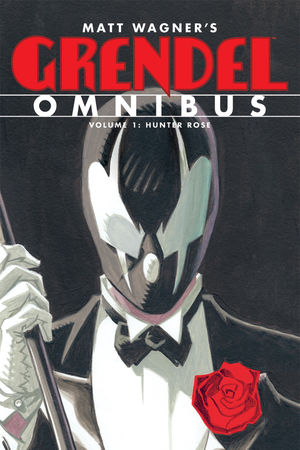
Episode 7: What's It Worth?
Player Assumption #1: They're always doing the right thing.
Wick gives us a scenario where the PCs wake up without memories in a space station where everything has been murdered and space spiders have infested everything. They find out they were mercs there to steal spider serum from a research center and who killed everybody and they had amnesia because- well he really doesn't say but I think the spiders had a thing to do it with it? Anyway, the PCs have spiders who have taken over their ship and another kill team on their way after them. So they have to find a way to team up with the spiders and survive!
This is a little cheap, because it starts with the players as bad guys in medias res . The bait and switch story was more interesting, even if the presence of Carter tends to occlude anything interesting Wick has to say.
Player Assumption #2: The players are the protagonists.
This one has the PCs traveling overland and then their guide abandons them in the wilderness without supplies.
John Wick posted:
How did this happen? The players treated the NPC like... well, like most players treat NPCs: a pile of bantha poo-doo. So, he left ‘em. Alone in the dark.
They don’t even know how to find true north.
That's a fair scenario, wait don't reach for the asshole dial, Wick!
John Wick posted:
And while they’re out in the woods, the Ranger saved the kingdom, married the king’s daughter and stand in line to inherit the throne.
Hey, wait a second... was that Dueling Banjos ...?
Oh, you had to turn up the asshole dial to 11... oh... well... time to rape some PCs, I guess. John told me to!

Player Assumption #3: The world revolves around us.
John Wick sez: if you're not willing to die for your cause, you're not a hero, and oh, if you're a hero, you're going to die for your cause. And if you're not a hero you're just game meat.
Seriously.
John Wick posted:
I’ve GM’d for groups who thought having big guns made them heroes. I introduced them to guys with bigger guns. They weren’t heroes. They were Swiss cheese in seconds.
I’ve GM’d for groups who thought having big spellbooks made them heroes. I introduced them to guys who didn’t need spellbooks. Frogs, every last one of them.
You want to be a hero? It takes more than 100 points, a cool name and witty banter. Just because you assume you’re the hero doesn’t make it necessarily so.
That’s a title you’ve got to earn.
On to the next one.
Next: "'Your head explodes,' I told him. 'You’re dead.'"
"Suddenly, I feel like the Crypt Keeper."
Original SA post 17 hoursPlay Dirty part 10: "Suddenly, I feel like the Crypt Keeper."
Wick, at the end of chapter 7, said there would be tricks for players. We don't get that. Instead we get some themed articles based on movie conventions. He notes some of these require players who are aware of the trouble they're getting into, and not to just spring TPKs on people.
Episode 8: Let's All Go to the Movies!
The first is having a time bomb planted in you, much like Escape From New York . He points at it as a way of focusing players, creating a short-term game, and seeing what people do when facing imminent doom. (The fact that the protagonist of the movie walks away alive and smug is dutifully ignored.)
He talks about a Cyberpunk game he ran for a year which he ended by setting down an egg timer, and each hour a PC could explode, booby-trapped by the corporation they had worked for. Each hour a character died, they worked out they couldn't survive, but the last character was able to get to the villain in time to go boom.
Which, at the least, is pretty Cyberpunk , I have to agree.
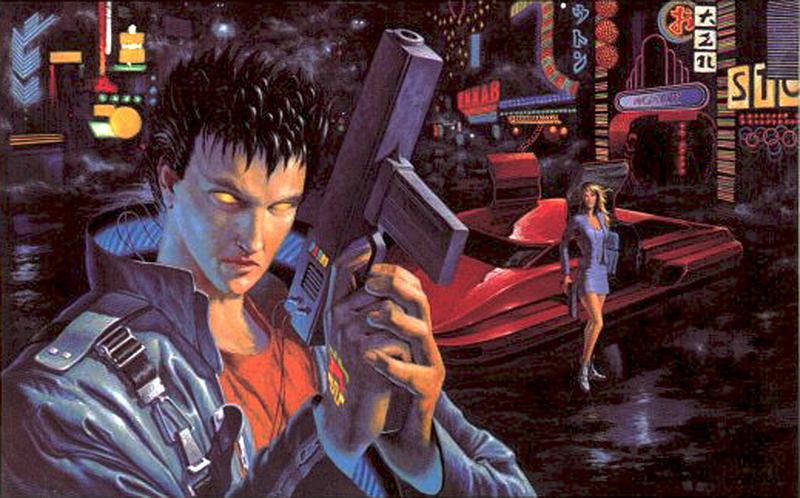
The second he brings up is the idea of noir films as a search for self-discovery, bringing in Angel Heart as an example, where the protagonist slowly discovers he made a terrible deal with the devil.
John goes to a Marvel Super Heroes game where PCs played Heroes for Hire sorts. If you've gotten this far, you know where this is going; they do jobs for the Kingpin and Doctor Doom, then the Avengers show up to punch them. So it goes.
The third film he brings up is Groundhog Day , using an example of a time he wanted to run Over the Edge and people wanted to play AD&D . Well, far be it from Wick to bow to player desires. Instead, he had them trapped in a time loop until one of them suicides and ends up waking in a lab in the Over the Edge setting. So it's not about Groundhog Day , but questioning the nature of reality or something and fuggit movin' on.
He also brings up a Chill game where he brought in an Over the Edge scenario where the PCs have amnesia (somehow) and have spooky adventures until a Mysterious Figure lures them in with the promise of answers only to reveal the true masterminds which were the players all along and are given a gun-
John Wick posted:
Did they pull the trigger? Sorry. I don’t kiss and tell.
I considered including an animated gif of somebody flipping the bird here but I think I'll restrain myself, it might look like I'm flipping the reader off.
There are a few more examples of adapting movies to different settings (I do like the Scent of a Woman ripoff where you're taking a retired and cursed adventurer out for one last romp).
On to the next one.
Next: "When Viscicitude came to town (a nasty vamp disease for those who don’t know), I started giving out the ones with the crunchy middle."
"Come to think of it, I can’t remember if this was my D&D game or someone’s that I played in."
Original SA post 15 hoursPlay Dirty part 11: "Come to think of it, I can’t remember if this was my D&D game or someone’s that I played in. "
It's time for Wick to talk about XP.
First off, he offers a mechanic where he makes people state what they're practicing, and all XPs have to go to that thing until they're done. If they switch their focus, they lost their XPs. No justification is given, so we go on.
Episode 9: "Please Sir, Can I Have Some More?"
He notes that even all of the games he's designed use XP in a standard way, but he's going to try to bust our assumptions about them like the Kool-Aid Man filled to the brim with nitro, no doubt.
The first bit is Wick poo-pooing character equality.
John Wick posted:
It’s the thought that All Characters are Created Equal. The assumption that all characters are equal is ridiculous. Is Elric equal with Moonglum? Is Aragorn equal with Gandalf? Is Frodo equal with Aragorn? Now, granted, Fafhrd and the Mouser are pretty equal, but they’re the exception rather than the rule.
Man, I'd much father play Fafhrd and the Grey Mouser than the cast of Rings , the Rings guys don't have very much fun. But Wick suggests we have players do prose writeups of their characters and the GM assigns stats, though not to just reward the wordy folks. Instead, giving some Vampire examples, he suggests rewarding the character you find more interesting.
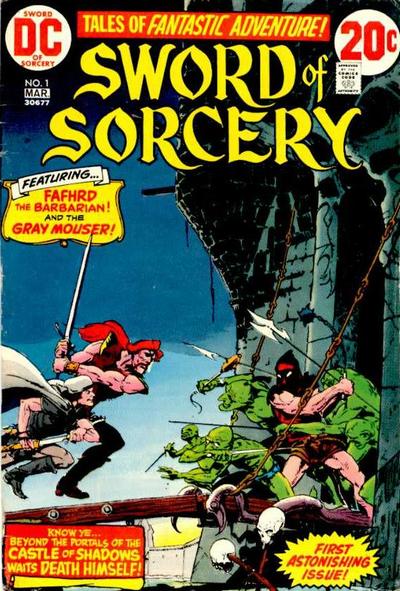
The second bit is for games that offer bonus XP for the best roleplayer or biggest ham or the like, and he suggests making sure that the quieter players aren't singled out, and instead to reward something valuable they do when they do it, so it's clear what you value about them. It's a neat idea, but I think that sort of reward system is better with expendables (fate, drama, hero, whatever points), which most games have now incorporated. Heck, it wasn't that uncommon when this was written. But that's just me editorializing.
The third bit is just having players get a bonus XP each session to aware to another player. (That seems positively quaint in the face of games like Tenra Bansho Zero these days that basically have the players throwing XP at each other wildly, but it's a nice idea.)
The fourth bit is about finding ways to reward players outside of XP. He talks about giving people special magic item rewards, like a luckstone and sword of sharpness combo for a luck-themed duellist. Another was a word-keyed magic hammer for a dwarf under a curse that he couldn't talk without going a berserk. Wait, is that a reward? He talks about making sure social characters get rewarded with allies and surprise aquaintances.
Fifth bit is a diversion where he talks about some friends making a religious-themed RPG, but-
John Wick posted:
Now, in my book, Faith sums up to “Believing in something you can’t prove.” If you’re gonna have Faith in an RPG (something I’m figuring out in Orkworld right now), you can’t call it “faith.” There’s a mechanic for it. Players can see it. Players can prove it. That ain’t Faith. That’s Devotion.
And with that thought, another came to me. The game system should really use two sets of dice: d10s and d6s. If the characters were serving their god, they got to use d10s. If they were serving their own worldly interests, they only got to use d6s. Problem is, the Target Numbers don’t change. Heh, heh, heh.
(Of course, now that I think of it, we could always throw in the “Sinful Rule”: serve the Enemy, you use d4s.)
That’s one for all you clerics out there. Hope you get to see it soon.
I don't think we ever saw that one. Wait, did he just avoid mechanics by inventing a mechanic? That's some Zen shit, right there.
Lastly, there's a Vampire game where he represented blood points with Hershey's Kisses, but when a vampire disease came around, he used ones with almonds to represent that.
John Wick posted:
By the time they bit down, it was already too late.
Uh-huh.
Next: "I’ve mentioned my Vampire character before. You know, the super-duper killing machine Assamite nobody can stop?
Oh, right, the example he gave of an awesome character that you should reward was a super-badass assassin vampire that sends his victims flowery letters about how they are going to die and then goes and kills them but went Buddhist and is trying to find enlightenment so doesn't kill anyone anymore. He compares it to an assassin NPC from one of his games that was a "murder as an art form" flowery vampire assassin who he says wasn't as interesting.
Well, the more interesting combat-maxed vampire assassin, anyway.
On to the next one.
"If you know your GM doesn’t flesh out NPCs, start getting conversational."
Original SA post 14 hoursJohn Wick posted:
(A Minor Prelude: Thank you to everyone who found me at Origins and said,
“I love your column and use your techniques all the time!” Big thanks also go out to the people who said, “I really like your column. I don’t use the ideas, but they give me different ideas to use.” Thanks also go out to the people who said, “I like your column. I disagree with nearly everything you say, but its fun to read, so I try to catch it every month.”
(Thanks guys.)
Play Dirty part 12: "If you know your GM doesn’t flesh out NPCs, start getting conversational."
Now, Wick tells GMs to "get lost!", he wants to talk to players about a secret: GMs want to be entertained by players.
It was a secret.
Chapter 10: The Players Strike Back
He notes a time that his super-awesome ex-assassin vampire went in and took down a whole cop station nonlethally to rescue his PC, and says GMs will let you get away with a lot if it helps the party. He titles this "breaking the rules" but no rules seem to be broken.
In addition, he lauds players who play to their character's intelligence and knowledge by having them to do dumb or ignorant things that keep things more entertaining, and that GMs won't punish you if you're keeping things moving.
Then, he adds to know your GM and go along with stuff that they like. Or challenge them in their weak spots, like starting fights if you know your GM is lousy at fighting!... but not to go against the grain of his plan on purpose to ruin fun .
Or to give your character a sudden twist, like having them find religion or fall in love and have that become their main motivation, not so much that you can't still have adventures, but to shift your character's motivation for adventuring.
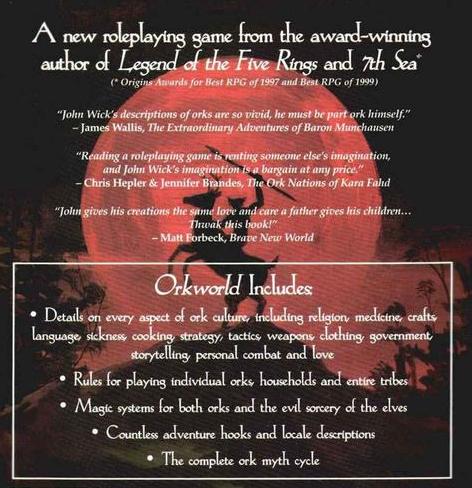
This column is shorter than the rest (Wick was busy with various things, including Orkworld ), so that's what we get. And... that was that. That's the last regular column that Play Dirty had. He returned to do one last column for Pyramid's 10th anniversary, so the next one's the last.
So, on to the last one.
Next: "That’s when she shrinks down and pulls the hood of her sweatshirt over her head. Poor thing."
"These wonderful folks who reminded me why I love gaming and I return the favor by doing absolutely awful things to their characters."
Original SA post 13 hoursPlay Dirty part 13: "These wonderful folks who reminded me why I love gaming and I return the favor by doing absolutely awful things to their characters."
I'm mostly going to just let Wick talk, I don't have much to add here.
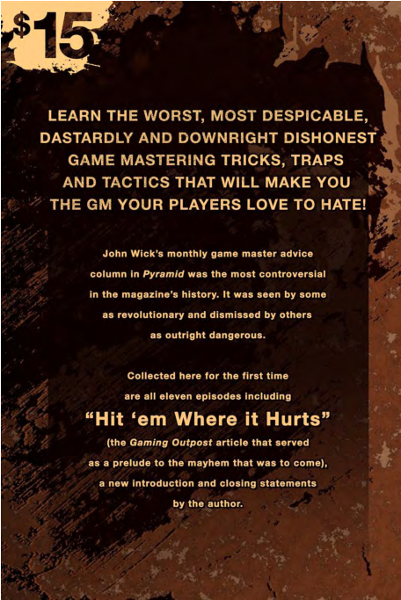
Episode 11: The Return of Play Dirty
John Wick posted:
There’s a new girl in my life. I say “girl,” because that’s what she is. Barely out of high school, but smart and cute as a button. And bouncy. She’s gained the Secret Superhero Nickname of “Happy Fun Ball.” Cute, bouncy, and full of potential disaster. “Do not taunt Happy Fun Ball” is what everyone says whenever someone gives her a hard time. ‘Cause you just don’t know what she’s capable of.
Happy Fun Ball works with me at my current place of employment (which shall remain nameless... until the bio section of this article) and when she found out I was running a Dungeons & Dragons game, she jumped at the opportunity.
(Yes—believe it or not, a Dungeons & Dragons game. One of the not-so-dirty secrets I’ve learned of being a good GM is you run what the players want to play, not what you want to run. Remember this rule, and, as the Umpa Lumpas sing, you will go far.)
The workplace was Neopets .
John Wick posted:
Thieves. Just thieves. No, not “rogues.” Thieves who call themselves rogues are like Trekkies who call themselves “Trekkers.” Lame.
John Wick posted:
I can get away with a thief-paladin this because I’ve ditched alignment. Funny how many ideas that liberates, eh?
At one point Wick announced he was going to do a "Book of Thieves" for d20 that never emerged. You can still find the advert on the Pathfinder License Agreement registry.
John Wick posted:
The assassin-priests of Ikhalu. They’ll be seeing your d20 System shelf any day now.
They don't, but they do show up in Enemy Gods .
John Wick posted:
Well, our Happy Fun Ball has chosen her thief to be a specialist in knives. So, while they’re all fighting these assassin-priests, she sees one of those magic knives in the dead hand of an Ikhalu Priest... and I tell her to make a Willpower Save. She looks confused at me. “What for?” she asks.
“Just do it,” I tell her, firmly, but with a smirk and a wink, just to let her know nothing’s gonna kill her. So, she does. And she fails. And I say...
“The next thing you know—you’ve got the dagger in your hand.”
Happy Fun Ball jerks in her seat. “I’ve what ?” she asks.
“And,” I continue, “there’s an Ikhalu priest with his back turned to you.” The smirk stays on. “That means if you attack him now, you’ll get your full sneak attack damage bonus.”
She nods. “Okay,” she says.
“You don’t need to roll to attack,” I tell her. "Your strike hits perfectly. Roll for damage and assume you got a critical.”
She’s smiling now. She’s not too much of a noob to know what that means. She rolls a whole handful of dice and adds up the damage. She tells it to me. I don’t even consult the guy’s hit points. Why bother? The moment is the moment, and it’s moving fast. No need to ruin it with number checking now.
“Your knife enters his back, slips between two ribs and finds his heart. You feel the pointed blade slip into the muscle there, and you feel something cold rush down your arm, into your chest, and down into your own heart... before it slips away.”
The thief-paladin asks, “Was that his soul?”
I say nothing. Okay. That’s a lie. I do say something. “Annie,” I say to Happy Fun Ball. “You get a Villain Point.”
The whole table gasps. We’ve been playing for many months now, and they’ve never even heard of Villain Points .
“What’s a Villain Point?” she asks me.
“It can’t be anything good,” says Evilzug, the thief-sorcerer-noble.
“Wanna know what it does?” I ask Happy Fun Ball.
She nods. I smile. “Then spend it,” I tell her. She shudders and hides under the hood of her sweatshirt. Poor little thing.
Happy Fun Ball has had that Villain Point for a few months now. Every time she’s in trouble, every time one of the other characters is in trouble, every time they could really use a hand, I always turn to her and say, “You know, you could spend your Villain Point.”
That’s when she shrinks down and pulls the hood of her sweatshirt over her head.
Poor thing. One day she’ll find out what a Villain Point does. And so will the other PCs. But, until that day, they’ll just have to sweat it out... knowing that one of them has a Villain Point. And could spend it at any moment.
Now, you may be asking, just what does a Villain Point do? Faithful Reader, the answer to that question should be obvious! It is obvious to all those astute GMs out there who have used the same technique. It isn’t a new one. It’s a very old one. Something I picked up a hundred years ago in Tibet from a wise old GM who taught it to me in exchange for a d16—a rare artifact, indeed.
What does a Villain Point do? My friend, you just saw what it does. It sits on Happy Fun Ball’s sheet and stares at her. Reminds her that she’s capable of doing something awful... something dreadful... something—dare we say it?— EVIL .
That’s what it does. It mocks her, torments her, and yes, even taunts her (do not taunt Happy Fun Ball). And I don’t have to do anything at all. Just ask her once a session, when she’s rolled really cruddy and someone’s at 9 hit points and really needs help right the hell now ... and it says to her, “ I could help... all you have to do is ask.”
Just one little Villain Point. It’s changed the face of the game. Gave it a depth it didn’t have before. Brought to focus what all the other PCs are capable of becoming. Villains. And it teaches them something else, too. That not all villains are born evil.
Some are smart, cute, bouncy girls who duck under the hood of their sweatshirts when things get hot. To hide from that little point at the top of her character sheet.
John Wick posted:
Conclusion
GM RULES
Rule #1:
There are no rules.
Rule #2:
Cheat Anyway
On to the... huh. That's all. Later, Wick.
Next: We return to the Monsterhearts writeups already in progress.